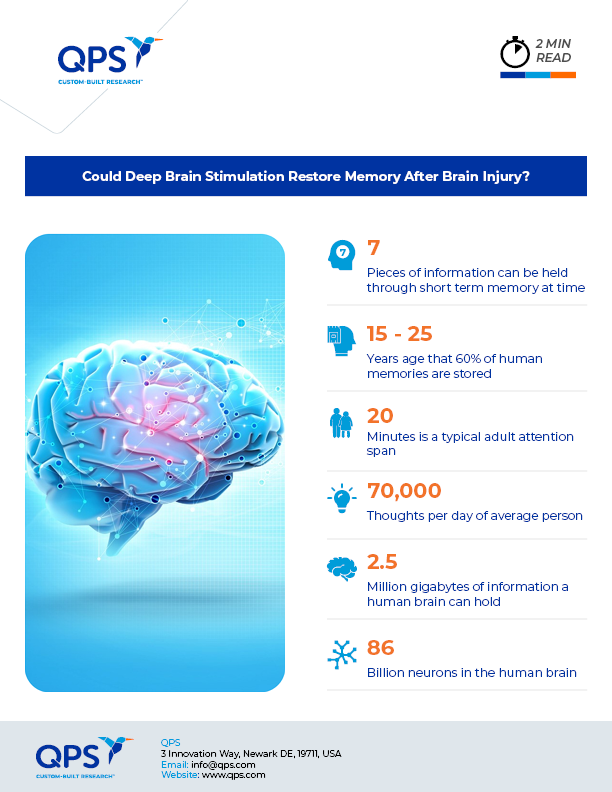With a deep brain stimulation device called a “memory prosthesis,” researchers hope that they may one day be able to improve memory in people who have memory impairment resulting from traumatic brain injuries. The device consists of electrodes implanted about 10 centimeters deep in the brain and is designed to replicate hippocampal function. The hippocampus plays a role in both short-term and long-term memory.
In an article published in Frontiers in Human Neuroscience, researchers, led by Robert Hampson, a neuroscientist at the Wake Forest School of Medicine in North Carolina, and Dong Song, a biomedical engineer at the University of Southern California, Los Angeles, reported results of experiments with the device in 24 people receiving brain monitoring for epilepsy, including some who also had brain injuries.
Testing Two Models of Brain Stimulation
The researchers recorded the electrical activity that occurs in the brain when memories are formed and then compared two models that replicated the activity during a memory challenge test. One type, called the memory decoding (MD) model, recorded and copied patterns that reflected an average of the electrical activity that occurred in each participant. The second type, called the multi-input, multi-output (MIMO) model, represents a closer approximation to the specific patterns of electrical inputs and outputs that occurred in an individual’s hippocampus when memories were formed.
To evaluate the two models, the participants completed a series of memory tasks. Each person was shown an image on a computer screen, and after a delay, viewed the same image again, along with a variety of other images. The participant was asked to identify the image they had previously viewed. Each person completed 100 to 150 of these tasks, designed to test short-term memory. After a period ranging from 15 to 90 minutes, the study participants completed a second round of similar tests, designed to evaluate long-term memory.
The researchers reported that the recorded activity was different for each person, reflecting their unique hippocampal activity. Personalizing brain stimulation is “a really important thing to be doing,” said Josh Jacobs at Columbia University, who also studies brain recordings from people with epilepsy but was not involved in the research. The customized approach likely improves the impact of the device.
Promising Results
The results showed that the technology significantly improved the participants’ scores on the memory tests, with improvements ranging from 11 percent to 54 percent, Hampson reported. The MIMO model, which more closely reflects hippocampal activity, had better results, on average, than the MD model. People who had the poorest baseline memory performance had the biggest improvements. The researchers suggest this could be because there’s “more room for improvement.”
The participants had the electrodes removed after a few weeks, after investigations into their epilepsy were complete. The researchers hope that the memory improvements could persist. It is possible that the stimulation may have reinforced memory-supporting activity in the hippocampus.
Future Possibilities
Among people with memory impairments, brain injury patients would be the best fit for this technology, and likely the first to receive it. This is because the device could target the specific area of injury. Diseases like Alzheimer’s disease, on the other hand, result in widespread damage across many regions of the brain. This would make it more difficult to target the intervention.
According to Kim Shapiro, a neuroscientist at the University of Birmingham in the UK, who was not involved in the research, the device could work, in principle. “It’s a glimpse into the future of what we might be able to do to restore memory,” he concluded.
Did you enjoy this blog post? Check out our other blog posts as well as related topics on our Webinar page.
QPS is a GLP- and GCP-compliant contract research organization (CRO) delivering the highest grade of discovery, preclinical and clinical drug research development services. Since 1995, it has grown from a tiny bioanalysis shop to a full-service CRO with 1,200+ employees in the U.S., Europe and Asia. Today, QPS offers expanded pharmaceutical contract R&D services with special expertise in neuropharmacology, DMPK, toxicology, bioanalysis, translational medicine and clinical development. An award-winning leader focused on bioanalytics and clinical trials, QPS is known for proven quality standards, technical expertise, a flexible approach to research, client satisfaction and turnkey laboratories and facilities. Through continual enhancements in capacities and resources, QPS stands tall in its commitment to delivering superior quality, skilled performance and trusted service to its valued customers. For more information, visit www.qps.com or email [email protected].






